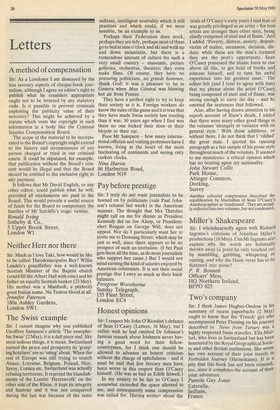Honest opinions
Sir: I respect Mr John O'Riordan's defence of Sean O'Casey (Letters, 16 May), but I rather wish he had omitted Dr Johnson's famous remark about Irishmen never having a good word for their fellowcountrymen, for I think one should be allowed to advance an honest criticism without the charge of spitefulness — and it must be said that few literary men have been worse in this respect than O'Casey himself. (He was as bad as Edith Sitwell.) In my anxiety to be fair to O'Casey I somewhat exceeded the space allotted to me, and consequently some compression was called for. Having written about the trials of O'Casey's early years I said that no was greatly privileged as an artist --`for true artists are stronger than other men, being chiefly composed of steel and of flame.' And I added :Poverty, distress, anxiety, despair; victim of malice, meanness, derision, disdain: while these are the man's torment they are the poet's opportunity. Sean O'Casey possessed the titanic force to rise above all this, to get hold of books and educate himself, and to turn his awful experience into his greatest asset.' The editor felt (and I tend to agree with him) that my phrase about the artist O'Casey being composed of steel and of flame, was strong enough to carry the day — and he omitted the sentences that followed.
Also, after having drawn attention to his superb account of Shaw's death, I added that there were many other good things in the volumes 'strangely at variance with its general style.' With those additions, or without them, I do not think that I 'vilified' the great man. I quoted his opening paragraph as a fair sample of his prose style throughout much of the volumes. It seemed to me monstrous: a critical opinion which has no bearing upon my nationality. John Stewart Collis Park House, Abinpr Common, Dorking, Surrey Another editorial compression described the republication by Macmillan of Sean O'Casey's Autobiographies as 'condensed'. They are actually collected Into two volumes, but not condensed.










































 Previous page
Previous page